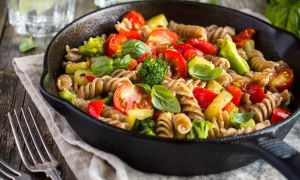The saying, "Our eyes are bigger than our stomachs", is true for some people, especially if it's our favorite food. There is a tendency for many people to eat whatever is in front of them. This could be detrimental for losing weight. Some restaurants have plates big enough to feed two people. If you are trying to lose weight, eat on a salad plate. When you are done, you are done. You will probably eat enough calories to feel satisfied, not stuffed.
Continue Learning about Portion Control
Important: This content reflects information from various individuals and organizations and may offer alternative or opposing points of view. It should not be used for medical advice, diagnosis or treatment. As always, you should consult with your healthcare provider about your specific health needs.

